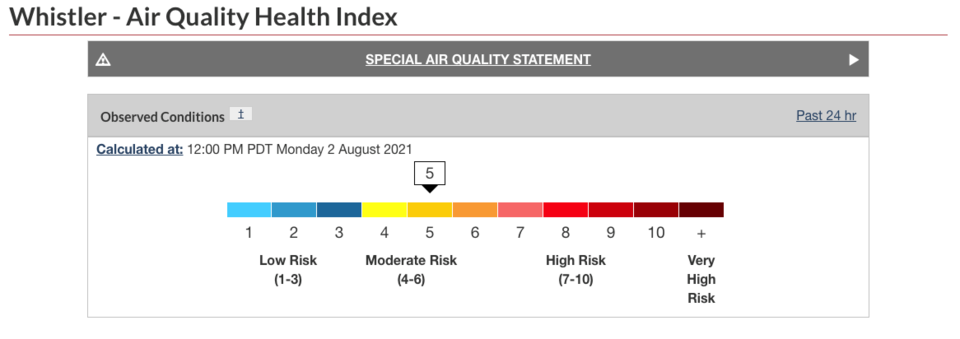With smoke from wildfires in Washington state and B.C.’s Interior now blanketing Whistler and the Lower Mainland, Vancouver Coastal Health (VCH) is urging the public to plan in advance to minimize exposure as temperatures remain high.
As of noon on Monday, Whistler’s air quality was listed at 5 (moderate risk). Check for updates here.
Though wildfire smoke is different from air pollution caused by traffic or industry, it is also harmful to human health, especially in older adults, infants, young children, pregnant women and people with chronic conditions such as asthma, chronic obstructive pulmonary disease, and heart disease, VCH said in a release.
The public can protect itself by taking these steps:
· Reduce time spent outdoors and reduce strenuous activities, because breathing harder means inhaling more smoky air.
· While closing windows and doors can help to keep out smoky air, opening doors and windows can be helpful to cool indoor spaces when it is cooler outside than inside (typically overnight). For most people heat stress is a bigger health risk than smoky air. During hot and smoky conditions, it is recommended to prioritize cooling indoor spaces when possible.
· Confirm you have enough of your medications, especially rescue medications for breathing.
· Create a cleaner air room in your home using a portable HEPA air cleaner if possible.
· Stay hydrated.
· Pay attention to air quality reports, especially the air quality health index.
· Spend time in a home or community space that has air conditioning, which will have cleaner air. Look for designated cleaner air spaces in your community with enhanced air filtration, however, if you can’t find one, most buildings with air will have HVAC systems that help people from experiencing irritating symptoms.
“People with pre-existing medical conditions should take extra precautions during this time, including monitoring for symptoms and keeping rescue medications with them when outdoors,” the release said.
“Common symptoms can include discomfort when breathing, eye irritation, runny nose, sore throat, headaches, and mild cough. If you experience these symptoms, seek spaces with clean air and reduce physical activity. If you experience more severe symptoms such as shortness of breath, severe cough, dizziness, chest discomfort, heart palpitations, or wheezing, seek medical attention.”
Find more information about wildfire smoke and its effects from VCH HERE and from the British Columbia Centre for Disease Control HERE.




